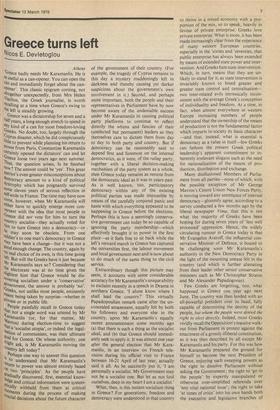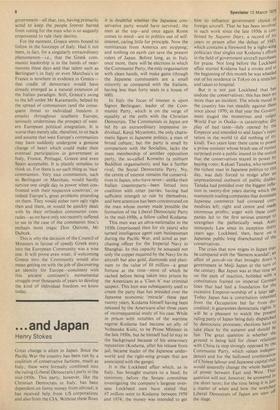Greece turns left
Nicos E. Devletoglou
Athens 'Greece badly needs Mr Karamanlis. He is as useful as a can-opener. You can open the C5 n and immediately forget about the can°Pener'. This classic epigram coming, not altogether unexpectedly, from Mrs Helen Vlachos, the Greek journalist, is worth recalling at a time when Greece's swing to the left is steadily growing. Greece was a dictatorship for seven and a half years, a long enough stretch to spend in any kind of a can for most freedom-loving Greeks. No doubt, too, largely through the G.Yprus disaster, which he did conspicuously little to prevent while planning his return to Dower from Paris, Constantine Karamanlis certainly opened the dictators' can and let Greece loose two years ago next summer. Thus, the question arises, Is he finished now? The answer could be `yes'. This great patriot's even greater misconceptions about delnocracy amount to a kind of political dystrophy which has poignantly survived sfte eleven years of serious reflection in self-exile in France. The time may have now c911.1e, however, when Mr Karamanlis will either have to quickly emerge more conversant with the idea that most people in Greece did not vote for him to turn the cOuntry socialist—they actually voted for ihiol to turn Greece into a democracy—or ile may soon be obsolete. From one soldier's to one man's democracy in Greece NY have been a change—but it was not a good enough change. The country, again by no real choice of its own, is this time going Left. But will the Greeks have it just because r Karamanlis says so? Considering that tr!e electorate was at no time given the slightest hint that Greece would be discovering socialism under a `conservative' 8,..?vernment, the answer is probably `no'. 'reeks, not unlike most people, eminently resent being taken by surprise—whether in Private or in public life. , People painfully recall in Greece today not a single word was uttered by Mr t.aramanlis (or, for that matter, Mr i'Llavros) during election-time to suggest illat a `socialist utopia', or indeed the legalsation of communism, was their ultimate 8°.al for Greece. On whose authority, one hlight ask, is Mr Karamanlis moving the country left today ? is Perhaps one way to answer this question to understand that Mr Karamanlis's ,oeturn to power was almost entirely based o two 'principles'. As the people have ,dually discovered, first, essential knowtc.ige and critical information were systematically withheld from them at critical erlIrmlents during the process of making ruclal decisions about the future character of the government of their country. (For example, the tragedy of Cyprus remains to this day a mystery maddeningly left in darkness and thereby causing yet darker suspicions about the government's own involvement in it.) Second, and perhaps more important, both the people and their representatives in Parliament have by now become aware of the undeniable success under Mr Karamanlis in causing political party platforms to continue to reflect directly the whims and fancies of their (unelected but permanent) leaders as they themselves care to dictate them from day to day to both party and country. But if democracy can be reasonably said to depend first and foremost on the internal democratics, as it were, of the ruling party, together with a liberal decision-making mechanism of the party system as a whole, then Greece today remains as remote from the democratic ideal as it was in years past. As is well known, too, participatory democracy within any of the existing political parties was made impossible by means of the carefully conjured panic and haste with which everything appeared to be happening in Greece before the elections. Perhaps this is how a seemingly conservative government can today be so capable of ignoring the party membership—which effectively brought it to power in the first place—as it feels free to sit back while the left's onward march in Greece has captured the universities first, the labour movement and local government next and is now about to do much of the same thing to the civil service.
Extraordinary though this picture may seem, it accounts with some considerable accuracy for Mr Karamanlis's unique ability to exclaim recently in a speech in Drama in northern Greece. `I alone know where I shall lead the country!' This virtually Papadopoulian remark came after the unconcealed amazement, equally felt by both his followers and everyone else in the country, upon Mr Karamanlis's equally recent announcement some months ago (a) that there is such a thing as the socialist ideal, and (b) that Greece should immediately seek to apply it. It was almost one year after the general election that Mr Karamanlis, in an interview on French television during his official visit to France between 16-21 April of last year, actually said it all. As he succinctly put it, 'I am personally a socialist. My Government may not be a socialist one. But let us not fool ourselves, deep in my heart I am a socialist.'
What, then, is this instant socialism thing in Greece? For generations, freedom and democracy were understood in that country to thrive in a mixed economy with a proportion of the mix, so to speak, heavily in favour of private enterprise. Greeks love private enterprise. What is more, it has been made increasingly clear from the experience of many western European countries, especially in the 'sixties and 'seventies, that public enterprise has always been extended by means of extended state power and intervention. And Greeks hate state intervention. Which, in turn, means that they are unlikely to stand for it, as state intervention is invariably known to breed greater and greater state control and centralisation— two inter-related evils intrinsically inconsistent with the average Greek's conception of individuality and freedom. At a time, in fact, when almost everywhere in western Europe increasing numbers of people understand that the ownership of the means of production is not the fundamental factor which imparts to society its basic character —and that, instead, what is essential is democracy as a value in itself—few Greeks can fathom the present Greek political leadership's apparent commitment to inherently irrelevant slogans such as the need for nationalisation of the means of production, distribution and exchange.
Many disillusioned Members of Parliament from all parties—none of which, with the possible exception of Mr George Mavros's Centre Union New Forces Party, is moving toward any semblance of internal democracy—gloomily agree, according to a survey conducted a few months ago by the liberal newspaper Vima, that this is not what the majority of Greeks have been hoping for during seven years of 'less well processed' oppression. Hence, the widely circulating rumour in Greece today is that Mr Evangelos Averoff, the influential conservative Minister of Defence, is bound to be challenging soon Mr Karamanlis's authority in the New Democracy Party in the light of the mounting unease felt in the country (and which is further alienating from their leader other senior conservative ministers such as Mr Christopher Stratos and Mr Alexander Papadogonas).
Few Greeks are forgetting, too, what happened in Greece one year ago next June. The country was then landed with an all-powerful president over its head, fully capable of determining the destiny of the people, but whom the people were denied the right to elect directly. Indeed, most Greeks vividly recall the Opposition's massive walkout from Parliament in protest against the enactment of a grossly illiberal constitution, as it was then described by all except Mr Karamanlis and his party. For this was how Mr Karamanlis prepared the ground for himself to become the next President of Greece, enjoying such sweeping powers as the right to dissolve Parliament without asking the Government ; the right to `go to the people' by expertly manipulated or otherwise over-simplified referenda over 'any vital national issue' ; the right to take 'at times of crisis' into his own hands both the executive and legislative branches of
government—all that, too, having primarily acted to keep the people forever barred from voting for the man who is so augustly empowered to rule their destiny.
For the moment, Greece seems bound to follow in the footsteps of Italy. Had it not been, in fact, for a singularly extraordinary phenomenon—i.e., that the Greek communist leadership is in the hands of nearmorons these days and that talent such as Berlinguer's in Italy or even Marchais's in France is nowhere in evidence in Greece— that cradle of democracy would have already emerged as a natural extension of the Italian paradigm. Still, Greece's swing to the left under Mr Karamanlis, helped by the spread of communism (and'the consequent threat to individual freedom it entails) throughout southern Europe, seriously undermines the prospect of western European political integration. It is worse than merely idle, therefore, to sit back and assume that west Europe's communists may have suddenly undergone a genuine change of heart which could make their eventual participation in government in Italy, France, Portugal, Greece and even Spain acceptable. It is plainly senseless to think so. For there is no such thing as 'nice' communism. Very nice communists, such as Berlinguer or Marchais, would hardly survive one single day in power when confronted with their respective countries', or indeed Europe's, great problems pounding on them. They would either turn ugly right then and there, or would be quickly dealt with by their orthodox communist comrades—as we have only too recently suffered to see in the case of the communist bloc's perhaps most tragic Don Quixote, Mr Dubcek.
This is why the decision of the Council of Ministers in favour of speedy Greek entry into the European Community was a wise one. It will prove even wiser, if welcoming Greece into the Community would also mean getting on with the job of discovering an identity for Europe—consistent with this ancient continent's monumental struggle over thousands of years to develop the kind of individual freedom we know today.



































 Previous page
Previous page